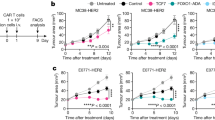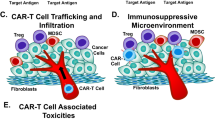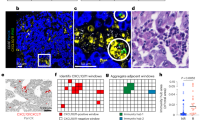Abstract
Mesenchymal stem cells (MSC) have received much attention in the field of hematopoietic stem cell transplantation because not only do they support hematopoiesis but also exhibit a profound immunosuppressive activity that can be exploited to prevent undesired alloreactivity. We have previously shown that their immunosuppressive activity is mainly exerted at the level of T-cell proliferation. Here, we show that MSC exhibit a similar antiproliferative activity on tumor cells of hematopoietic and non hematopoietic origin. In vitro, MSC produced the transient arrest of tumor cells in the G1 phase of cell cycle; this was accompanied by a reduction in the apoptotic rate even when survival factors were limiting. However, when tumor cells were injected into non-obese diabetic–severe combined immunodeficient mice in conjunction with MSC, their growth was much faster as compared to the group receiving only tumor cells. To explain the discrepancy between the in vitro and in vivo behavior, we suggest that MSC have the ability to form a cancer stem cell niche in which tumor cells can preserve the potential to proliferate and sustain the malignant process. We conclude that the clinical use of MSC in conditions in which a malignant disease is involved should be handled with extreme caution.
This is a preview of subscription content, access via your institution
Access options
Subscribe to this journal
Receive 12 print issues and online access
$259.00 per year
only $21.58 per issue
Buy this article
- Purchase on Springer Link
- Instant access to full article PDF
Prices may be subject to local taxes which are calculated during checkout







Similar content being viewed by others
References
Pittenger MF, Mackay AM, Beck SC, Jaiswal RK, Douglas R, Mosca JD et al. Multilineage potential of adult human mesenchymal stem cells. Science 1999; 284: 143–147.
Horwitz EM, Le Blanc K, Dominici M, Mueller I, Slaper-Cortenbach I, Marini FC et al. Clarification of the nomenclature for MSC: The International Society for Cellular Therapy position statement. Cytotherapy 2005; 7: 393–395.
Calvi LM, Adams GB, Weibrecht KW, Weber JM, Olson DP, Knight MC et al. Osteoblastic cells regulate the haematopoietic stem cell niche. Nature 2003; 425: 841–846.
Zhang J, Niu C, Ye L, Huang H, He X, Tong WG et al. Identification of the haematopoietic stem cell niche and control of the niche size. Nature 2003; 425: 836–841.
Dazzi F, Ramasamy R, Glennie S, Jones SP, Roberts I . The role of mesenchymal stem cells in haemopoiesis. Blood Rev 2005; 20: 161–171.
Glennie S, Soeiro I, Dyson PJ, Lam EW, Dazzi F . Bone marrow mesenchymal stem cells induce division arrest anergy of activated T cells. Blood 2005; 105: 2821–2827.
Koc ON, Gerson SL, Cooper BW, Dyhouse SM, Haynesworth SE, Caplan AI et al. Rapid hematopoietic recovery after coinfusion of autologous-blood stem cells and culture-expanded marrow mesenchymal stem cells in advanced breast cancer patients receiving high-dose chemotherapy. J Clin Oncol 2000; 18: 307–316.
Lee ST, Jang JH, Cheong JW, Kim JS, Maemg HY, Hahn JS et al. Treatment of high-risk acute myelogenous leukaemia by myeloablative chemoradiotherapy followed by co-infusion of T cell-depleted haematopoietic stem cells and culture-expanded marrow mesenchymal stem cells from a related donor with one fully mismatched human leucocyte antigen haplotype. Br J Haematol 2002; 118: 1128–1131.
Le Blanc K, Rasmusson I, Sundberg B, Gotherstrom C, Hassan M, Uzunel M et al. Treatment of severe acute graft-versus-host disease with third party haploidentical mesenchymal stem cells. Lancet 2004; 363: 1439–1441.
Olumi AF, Grossfeld GD, Hayward SW, Carroll PR, Tlsty TD, Cunha GR . Carcinoma-associated fibroblasts direct tumor progression of initiated human prostatic epithelium. Cancer Res 1999; 59: 5002–5011.
Allinen M, Beroukhim R, Cai L, Brennan C, Lahti-Domenici J, Huang H et al. Molecular characterization of the tumor microenvironment in breast cancer. Cancer Cell 2004; 6: 17–32.
Maestroni GJ, Hertens E, Galli P . Factor(s) from nonmacrophage bone marrow stromal cells inhibit Lewis lung carcinoma and B16 melanoma growth in mice. Cell Mol Life Sci 1999; 55: 663–667.
Nakamura K, Ito Y, Kawano Y, Kurozumi K, Kobune M, Tsuda H et al. Antitumor effect of genetically engineered mesenchymal stem cells in a rat glioma model. Gene Ther 2004; 11: 1155–1164.
Ohlsson LB, Varas L, Kjellman C, Edvardsen K, Lindvall M . Mesenchymal progenitor cell-mediated inhibition of tumor growth in vivo and in vitro in gelatin matrix. Exp Mol Pathol 2003; 75: 248–255.
Sato T, Sakai T, Noguchi Y, Takita M, Hirakawa S, Ito A . Tumor-stromal cell contact promotes invasion of human uterine cervical carcinoma cells by augmenting the expression and activation of stromal matrix metalloproteinases. Gynecol Oncol 2004; 92: 47–56.
Zhu W, Xu W, Jiang R, Qian H, Chen M, Hu J et al. Mesenchymal stem cells derived from bone marrow favor tumor cell growth in vivo. Exp Mol Pathol 2006; 80: 267–274.
Djouad F, Plence P, Bony C, Tropel P, Apparailly F, Sany J et al. Immunosuppressive effect of mesenchymal stem cells favors tumor growth in allogeneic animals. Blood 2003; 102: 3837–3844.
Studeny M, Marini FC, Dembinski JL, Zompetta C, Cabreira-Hansen M, Bekele BN et al. Mesenchymal stem cells: potential precursors for tumor stroma and targeted-delivery vehicles for anticancer agents. J Natl Cancer Inst 2004; 96: 1593–1603.
Pegoraro L, Matera L, Ritz J, Levis A, Palumbo A, Biagini G . Establishment of a Ph1-positive human cell line (BV173). J Natl Cancer Inst 1983; 70: 447–453.
Lozzio CB, Lozzio BB . Human chronic myelogenous leukemia cell-line with positive Philadelphia chromosome. Blood 1975; 45: 321–334.
Koeffler HP, Billing R, Lusis AJ, Sparkes R, Golde DW . An undifferentiated variant derived from the human acute myelogenous leukemia cell line (KG-1). Blood 1980; 56: 265–273.
Weiss A, Wiskocil RL, Stobo JD . The role of T3 surface molecules in the activation of human T cells: a two-stimulus requirement for IL 2 production reflects events occurring at a pre-translational level. J Immunol 1984; 133: 123–128.
Quinn LA, Moore GE, Morgan RT, Woods LK . Cell lines from human colon carcinoma with unusual cell products, double minutes, and homogeneously staining regions. Cancer Res 1979; 39: 4914–4924.
Di Nicola M, Carlo-Stella C, Magni M, Milanesi M, Longoni PD, Matteucci P et al. Human bone marrow stromal cells suppress T-lymphocyte proliferation induced by cellular or nonspecific mitogenic stimuli. Blood 2002; 99: 3838–3843.
Meisel R, Zibert A, Laryea M, Gobel U, Daubener W, Dilloo D . Human bone marrow stromal cells inhibit allogeneic T-cell responses by indoleamine 2,3-dioxygenase-mediated tryptophan degradation. Blood 2004; 103: 4619–4621.
Bhowmick NA, Neilson EG, Moses HL . Stromal fibroblasts in cancer initiation and progression. Nature 2004; 432: 332–337.
Gao J, Arbman G, Rearden A, Sun XF . Stromal staining for PINCH is an independent prognostic indicator in colorectal cancer. Neoplasia 2004; 6: 796–801.
Bissell MJ, Radisky D . Putting tumors in context. Nat Rev Cancer 2001; 1: 46–54.
Radisky D, Muschler J, Bissell MJ . Order and disorder: the role of extracellular matrix in epithelial cancer. Cancer Invest 2002; 20: 139–153.
Drize NJ, Keller JR, Chertkov JL . Local clonal analysis of the hematopoietic system shows that multiple small short-living clones maintain life-long hematopoiesis in reconstituted mice. Blood 1996; 88: 2927–2938.
Cunningham JJ, Roussel MF . Cyclin-dependent kinase inhibitors in the development of the central nervous system. Cell Growth Differ 2001; 12: 387–396.
Cheng T, Rodrigues N, Shen H, Yang Y, Dombkowski D, Sykes M et al. Hematopoietic stem cell quiescence maintained by p21cip1/waf1. Science 2000; 287: 1804–1808.
Yuan Y, Shen H, Franklin DS, Scadden DT, Cheng T . In vivo self-renewing divisions of haematopoietic stem cells are increased in the absence of the early G1-phase inhibitor, p18INK4C. Nat Cell Biol 2004; 6: 436–442.
Wang G, Bunnell BA, Painter RG, Quiniones BC, Tom S, Lanson Jr NA et al. Adult stem cells from bone marrow stroma differentiate into airway epithelial cells: potential therapy for cystic fibrosis. Proc Natl Acad Sci USA 2005; 102: 186–191.
Acknowledgements
This work was funded by Leukemia Research Fund and Cancer Research-UK. R Ramasamy is supported by MOSTI Scholarship - University Putra Malaysia. I Soeiro is supported by a PhD studentship from Fundação para a Ciência e a Tecnologia, Portugal.
Author information
Authors and Affiliations
Corresponding author
Rights and permissions
About this article
Cite this article
Ramasamy, R., Lam, EF., Soeiro, I. et al. Mesenchymal stem cells inhibit proliferation and apoptosis of tumor cells: impact on in vivo tumor growth. Leukemia 21, 304–310 (2007). https://doi.org/10.1038/sj.leu.2404489
Received:
Revised:
Accepted:
Published:
Issue Date:
DOI: https://doi.org/10.1038/sj.leu.2404489
Keywords
This article is cited by
-
Overcoming BCR::ABL1 dependent and independent survival mechanisms in chronic myeloid leukaemia using a multi-kinase targeting approach
Cell Communication and Signaling (2023)
-
Effectiveness and safety of mesenchymal stem/stromal cell for radiation-induced hyposalivation and xerostomia in previous head and neck cancer patients (MESRIX-III): a study protocol for a single-centre, double-blinded, randomised, placebo-controlled, phase II study
Trials (2023)
-
Potential functions and therapeutic implications of glioma-resident mesenchymal stem cells
Cell Biology and Toxicology (2023)
-
Paracrine Factors Released from Tonsil-Derived Mesenchymal Stem Cells Inhibit Proliferation of Hematological Cancer Cells Under Hyperthermia in Co-culture Model
Applied Biochemistry and Biotechnology (2023)
-
Fabrication of a three-dimensional bone marrow niche-like acute myeloid Leukemia disease model by an automated and controlled process using a robotic multicellular bioprinting system
Biomaterials Research (2023)



